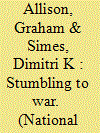| Srl | Item |
| 1 |
ID:
139733


|
|
|
|
|
| Summary/Abstract |
International Affairs: Mr. Ambassador, the Ukraine crisis shows convincingly that in the absence of wars between the leading states in the world, a special role is beginning to be played by information warfare, i.e., the struggle for the hearts and minds. This, however, does not change the essence. This still is about the striving to promote one's national interests and inflict a defeat on the "adversary." This is nothing new: The Crimean War and World War I were marked by active informational support, if this word can be used to describe direct official propaganda. If in the first case it was necessary to convince domestic public opinion about the necessity of military spending, in the second it was about the need to continue the war no matter how hopeless it seemed in late 1914. What could you tell our readers about the information warfare in the UK on the issue of Ukraine?
|
|
|
|
|
|
|
|
|
|
|
|
|
|
|
|
| 2 |
ID:
138616


|
|
|
|
|
| Summary/Abstract |
AFTER THE Soviet Union collapsed, Richard Nixon observed that the United States had won the Cold War, but had not yet won the peace. Since then, three American presidents—representing both political parties—have not yet accomplished that task. On the contrary, peace seems increasingly out of reach as threats to U.S. security and prosperity multiply both at the systemic level, where dissatisfied major powers are increasingly challenging the international order, and at the state and substate level, where dissatisfied ethnic, tribal, religious and other groups are destabilizing key countries and even entire regions.
|
|
|
|
|
|
|
|
|
|
|
|
|
|
|
|
| 3 |
ID:
144973


|
|
|
|
|
| Summary/Abstract |
THEY DO NOT LOOK relaxed or relieved, let alone pleased - two men who extend their hands to each other in the evening of September 13. 1955 in the famous photo: Federal Chancellor Konrad Adenauer and Soviet Prime Minister Nikolai Bulganin have just signed a final communiqué after several days of talks in Moscow and agreed to establish diplomatic relations between the Federal Republic of Germany and the USSR. Does this mean that Adenauer had just cemented the division of Germany after the second German state, along with the GDR, established full-fledged relations with the Soviet Union? Does this mean that Bulganin went too far in accepting the formula that "the establishment.... of normal relations.... should help resolve the main pan-national problem of the German people, i.e., the unification of Germany as a single democratic state"?
|
|
|
|
|
|
|
|
|
|
|
|
|
|
|
|